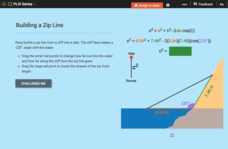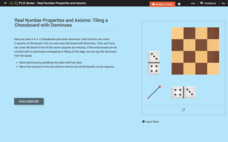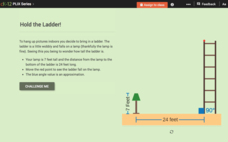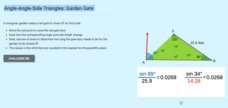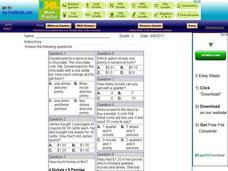CK-12 Foundation
Applications Using Linear Models: Scuba Diving
Dive into this resource on rates of change and linear models. Pupils use two sliders in an interactive to adjust water temperature and depth. They use a given linear equation to calculate the rate of change in water temperature per unit...
CK-12 Foundation
Area and Volume of Similar Solids: Similar Solids
Five questions make up an interactive designed to boosts knowledge of area and volume of solid figures. Question types include multiple-choice, true or false, and fill-in-the-blank. A scale model changes measurement to provide a visual...
CK-12 Foundation
Applications of Linear Systems: Alcohol Solution in Nursing
Solve alcohol systems to find the right solution. The interactive allows pupils to manipulate the amount of a solution and displays the total amount in a mixture. Individuals determine the amount of each solution needed to make 15 liters...
CK-12 Foundation
Law of Cosines: Building a Zip Line
Zip this resource into your lesson plans. Here is an interactive that shows how angles and lengths change based on conditions for a zip line. Scholars use the Law of Cosines to solve problems in this context.
CK-12 Foundation
Integers: Tiling a Chessboard with Dominoes
Ten questions make up an interactive all about integers. Scholars answer multiple choice, short answer, and discussion questions using a 4x4 chessboard and dominoes.
CK-12 Foundation
Integers that Represent Different Situations: Football Field
A football-themed interactive focuses on integers. Seven questions challenge scholars to show what they know by way of short answers, multiple-choice, and true or false. An open-ended question followed by a discussion concludes the...
CK-12 Foundation
Secant, Cosecant, and Cotangent Functions: Hold the Ladder!
Determine the length of a falling ladder. Pupils use an interactive to find the angle a ladder makes with the floor after it falls to answer questions. The scholars use the triangle formed in the interactive to determine values of...
CK-12 Foundation
Angle-Angle-Side Triangles: Garden Gate
Good fences make good gardens. Individuals use an interactive to see how angles and sides relate in a triangular-shaped garden fence. They apply the Law of Sines to find the length of the garden gate (third side of triangle) given two...
Shodor Education Foundation
Rabbits and Wolves
A change in a parameter can end in overpopulation. The resources gives pupils the opportunity to control the parameters of rabbits and wolves in a natural setting. Using the set parameters, the simulation runs and displays the population...
CK-12 Foundation
Basic Inverse Trigonometric Functions: Ladder
Lean a ladder against the wall to create an angle. Class members use an interactive application to determine the angle a ladder makes with the ground. Individuals respond to five questions using inverse trigonometric functions.
CK-12 Foundation
Prime Factorization: Chocolate Chip Factoring
An interactive resource challenges mathematicians to show what they know about prime factorization. Five multiple-choice, true or false, and discussion questions use chocolate chip cookies to set a real-world application of the...
Curated OER
My Test Book: Money Problems
In this online interactive math skills worksheet, students solve 10 multiple choice math problems that regarding money. Students may view the correct answers.
Shodor Education Foundation
Experimental Probability
Spin into a dicey experiment. Pupils use a spinner or a pair of dice to determine the experimental probabilities of each outcome. The interactive allows for either, one, five, or ten consecutive experiments. Using the applet, learners...



